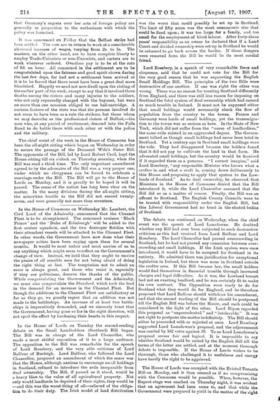In the House of Lords on Tuesday the second-reading debate
on the Small Landholders (Scotland) Bill began. The Bill was in charge of the Lord Chancellor, who made a most skilful exposition of it to a large audience. The opposition to the Bill was remarkable for the speech of Lord Rosebery, and the very able criticism of Lord Balfour of Burleigh. Lord Balfour, who followed the Lord Chancellor, proposed an amendment of which the sense was that the House, although anxious to encourage small holdings in Scotland, refused to introduce the evils inseparable from dual ownership. The Bill, if passed as it stood, would be a heavy blow to the value of all agricultural property. Not only would landlords be deprived of their rights, they would be —and this was the worst thing of all—relieved of the obliga- ti= to do their duty. The Irish model of land distribution was the worst that could possibly be set up in Scotland:' The limit of fifty acres was the most uneconomic size that could be fixed upon; it was too large for a family, and 'too small fOr the employment of hired labour. After forty-three years' responsibility as an owner he declared that if a Land Court and divided ownership were set up in Scotland be would be ashamed to go back across the border. If those dangers were removed from the Bill he would be its most cordial friend.


































 Previous page
Previous page